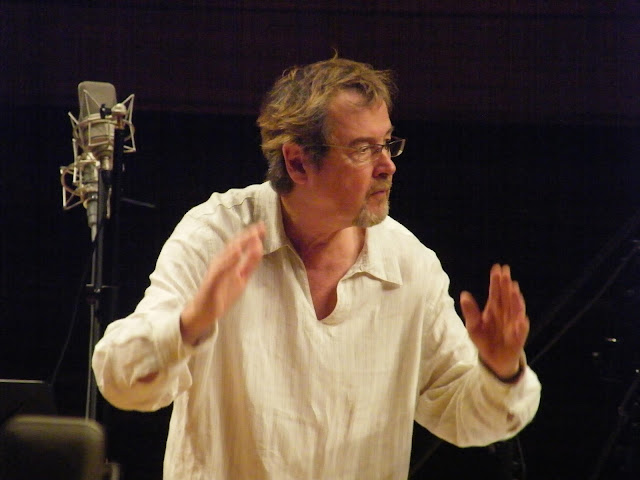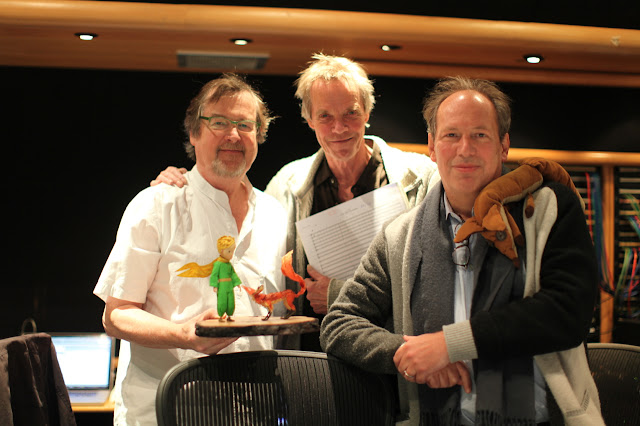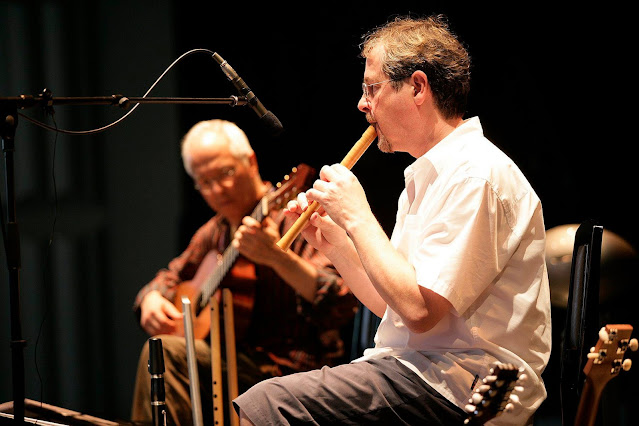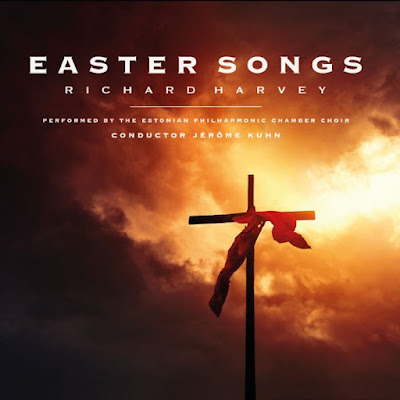 |
| Richard Harvey |
Composer Richard Harvey's Easter Songs were released as an EP on the Altus label earlier this year. Settings of poetry by George Herbert, Christina Rossetti and Joseph Mary Plunkett, they were recorded by the Estonian Philharmonic Chamber Choir, conductor Jérôme Kuhn, with an instrumental ensemble of two violins, cello and harp. Richard has had quite a diverse career. Now known both as a composer of classical music and a composer for film and TV, his early career encompassed playing in the pioneering Early Music ensemble Musica Reservata and the progressive rock and folk band Gryphon, and working with film composer Jean-Michel Jarre. Richard wrote his 1995 Concerto Antico for guitarist John Williams and his 2009 Concerto Incanto for recorder player Michala Petri.
The recording of the Easter Songs came about originally because the Swiss conductor, Jérôme Kuhn asked Richard for choral music for an Easter-themed concert. So, he went looking for texts, preferably something older (for copyright reasons), and either not used or not used to death. He found himself inspired by Christina Rossetti's writing, finding her poetry very singable and having set one poem of hers, he is resolved to look at her more, in the future. A further choice was the poetry of Joseph Mary Plunkett. Richard finds him a very interesting man, an Irish revolutionary, he was a passionate Republican but also very creative, yet was executed in 1916 when he was still in his 20s. Again, Richard found his texts very singable. The third piece came about because Jérôme Kuhn brought two of his choirs to London earlier this year, and they gave a concert at St James' Piccadilly, and for that, Richard wrote a further Easter piece. He had enjoyed setting George Herbert's poetry before, finding him very celebratory and open-hearted.
Last August (2022) Richard had a recording slot with the Estonian Philharmonic Chamber Choir (EPCC) and decided that he would record all three of the Easter Songs ahead of the premiere of the third one. He describes it as a rare treat to work with the choir and when they come up, he grasps the opportunity to work with the choir with both hands. Along with the EPCC, he drew on a pool of fine instrumental players who are at home in a variety of styles, and understand what he is after.
 |
| Richard Harvey (Photo: Paramet Odd Lerdkasem) |
He decided to issue the three songs as an EP. He admits being new to the idea of an EP but finds it nice not to have to think about how he would fill a disc lasting over an hour. Richard sees what he calls the demise of the CD with great sadness, feeling that it is hanging on for dear life. But it is still needed, performing musicians want something that they can give people whilst audience members often want to be able to buy something after a concert. He adds that when listening to streaming services, you tend not to get the background material that booklet notes provide, and now artists often need to have such information on their websites.
Rather late in life, Richard has found a niche with choral music and is writing it more and more, and with the works comes the enjoyable feature of making new relationships. That with the EPCC arose because of Arvo Pärt's son, Michael. Michael Pärt went to Kingston University and worked for Richard for a while. They discussed the EPCC and their recordings in Niguliste, a deconsecrated church in Tallinn. Richard calls the church an almost perfect acoustic, and it is very undisturbed by noise; it was there that they recorded his 2019 disc of choral music, Evensong, with EPCC, conducted by Heli Jurgenson.
Richard is not religious, but he finds himself inspired both by churches and by other people's feelings for them. A building like Niguliste brings centuries of vibes with it, and it should be able to inspire anyone. He is looking forward to working with the EPCC again, and you have to get them in the diary two years ahead of time!
Richard has had a diverse career as a composer in a variety of genres, conductor and performer on a wide range of instruments with a variety of different ensembles. He has spent the majority of his career fighting the need to specialise. Whatever he is doing, he always gives it his undivided attention, however, he has a problem in concentrating on just one area. He attributes this partly to influences when he was young. His father was an amateur composer and pianist who also played woodwind instruments and had a fairly broad taste in music. Then his main musical influence at school was a clarinettist who played the recorder, conducted and composed. The young Richard became obsessed with musical instruments of any and every kind. In his teens, he worked in a music shop in Kingston run by the Potter brothers, two kindly gentlemen who let him borrow instruments to take home and try. At college, he studied clarinet and recorder, his father's instruments. He adds, that the best way to write something is if you play the instrument. His recorder concerto, Concerto Incanto, has become popular with recorder players partly because he knows the instrument inside out, so he can make the performer look good and not trip them up.
 |
| Working on the sound-track to the new animated film The Little Prince composers Richard Harvey & Hans Zimmer, director Mark Osborne |
Whatever he is working on, he brings the scope and breadth of his significant experience to bear. He admits that he is perhaps not the best conductor in the world, but he is the best for his own music and the majority of his conducting experience has been in film score recordings. The first time he made any money as a musician was when writing music for TV commercials, it was simply expedient, but he enjoyed the move into film and TV drama. In his early career, in the USA you could not write music for both TV and film. If you had written for TV dramas, you would not be considered for film music. But it is all different now, and all the major film composers write music for Netflix dramas.
Richard points out that in the Baroque period, a composer like Handel was a multi-instrumentalist, composer, conductor, teacher and impresario, and most composers of the period were multi-tasking. After all, you build up far more experience this way, expertise in one area can usefully infuse others. Richard finds that having played in a band with a drummer, he can bring these energies to the classical world, making the music more exciting. He thinks that it is very important not to compare yourself to others, you will find your metier in the end, something will spring up that fits your combination of talents. Richard has trodden his own part for some time now and regards himself as very fortunate, though he needed to have belief in himself.
In the time before technology developed, he was only able to make demos of his pieces because he used a multi-track recorder and could play lots of instruments. In that way, he found his niche. Back in the day, you only go booked if they decided they could trust you with the budget, after all, composers were usually only able to play piano versions of the score ideas to the film companies. Richard's magpie instincts meant that he happened to be different, and could create demo recordings as well as create unique sounds.
But when all is said and done, his passport simply says that he is a musician.
He started playing the guitar when he was 11, and he describes his guitar playing as OK, commenting that he is better as a single-line player than chordal. But this meant that when he was writing his guitar concerto for John Williams he could play the music a bar at a time (sometimes slowly), thus ensuring it was playable. He feels that a concerto should be a joyful experience for the player and for the audience; it should be virtuosic, but should still be comfortable for the performer. As a clarinettist himself, there are concertos he does not want to play because you do not get any value out of them.
 |
| John Williams and Richard Harvey |
In 1989, Richard wrote an oratorio, Plague and the Moonflower to a libretto by Ralph Steadman. It had an obbligato guitar part, played by John Williams, and members of the guitarist's family heard it and said that John Williams should get a concerto from Richard. The result would be Richard's Concerto Antico. John Williams asked him for a work that could be a companion to or an alternative to Rodrigo's Concierto de Aranjuez. The guitarist got so many requests for the Rodrigo that he wanted another concerto to offer people. Richard has known John for 40 years, they are good friends, and he was touched that John trusted him with the commission. The concerto has become very popular, and Richard feels that it is one of the best recorded of John Williams' discs.
Looking ahead, Jérôme Kuhn has asked him for a short opera. Currently, Richard is looking at Britten's chamber operas and Holst's Savitri, and reading short stories. He is also keen to write more choral music and wants to write a clarinet concerto with a view to writing it for the players. He also has to carry on earning a living!
He has just finished scoring an animated film, Ozi, about an Orang-Utang forced out of its forest home by the palm oil industry, a subject close to Richard's heart. His music is written for symphony orchestra but uses Indonesian scales. The film is being backed by Leonardo di Caprio's conservation charity. Richard feels that this film and The Little Prince, his recent modern version of Saint-Exupéry's Le Petit Prince are both very suited to film with live music performance. He is a great believer in this, feeling that it is a way of bringing families into the concert hall.
He also moans about the way that the orchestra has not changed significantly in the last 100 years. To a large extent, he attributes this to the fact that the orchestras have certain musicians on salary, so if you want to write for a more diverse ensemble, then this costs.
Richard Harvey: Easter Songs - Estonian Philharmonic Chamber Choir, conductor Jérôme Kuhn - Altus, [download/stream]
Never miss out on future posts by following us
The blog is free, but I'd be delighted if you were to show your appreciation by buying me a coffee.
Elsewhere on this blog
- Reduced forces, but heightened drama: an intimate, chamber production of Wagner's Die Walküre from Regents Opera - opera review
- Style, imagination & not a little daring: a new staging of Handel's Saul at Berlin's Komische Oper - opera review
- No ordinary evening: Christof Loy directs Zandonai's Francesca da Rimini at the Deutsche Oper Berlin with Sara Jakubiak & Jonathan Tetelman - opera review
- The story is 40 years old but nothing much has changed about women's rights in the region: Bushra El-Turk on her opera Woman at Point Zero which comes to Covent Garden next month - interview:
- Regents Opera's new production of Wagner's Die Walküre: a photo essay
- Ein Sommernachtstraum in Essen: Jérémie Rhorer and Le Cercle de l'Harmonie - concert review
- Songs of heartbreak and loss: Lovesick, American counter-tenor Randall Scotting explores 17th-century song from Dowland to Purcell, Étienne Moulinié to Antonio Cesti - record review
- From Psychic Shellfish to a leading role in Wagner's Ring Cycle: Ingeborg Børch's Regents Opera journey - feature
- Grażyna Bacewicz's piano concertos and more: an exciting disc from Peter Jablonski & the Finnish Radio Symphony Orchestra - record view
- A lovely immediacy to the performances: in Monologues, Anna Bonitatibus explores a century of dramatic scenes for solo voice - record review
- Steeping listeners in Indian classical music without them knowing it: sitar player Jasdeep Singh Degun on his new disc, Anomaly, working on Opera North's Orpheus and more - feature
- Home












This comment has been removed by the author.
ReplyDelete